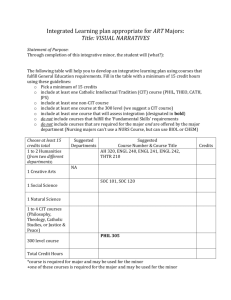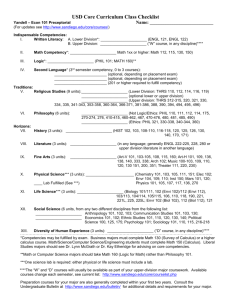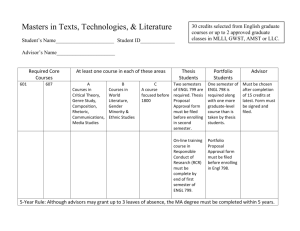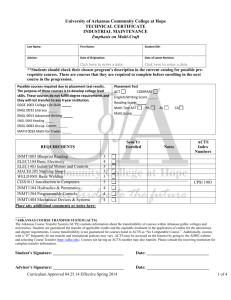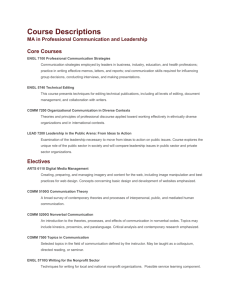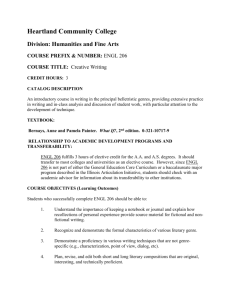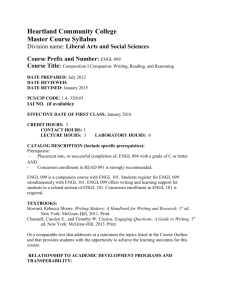2014 - Saint Louis University
advertisement
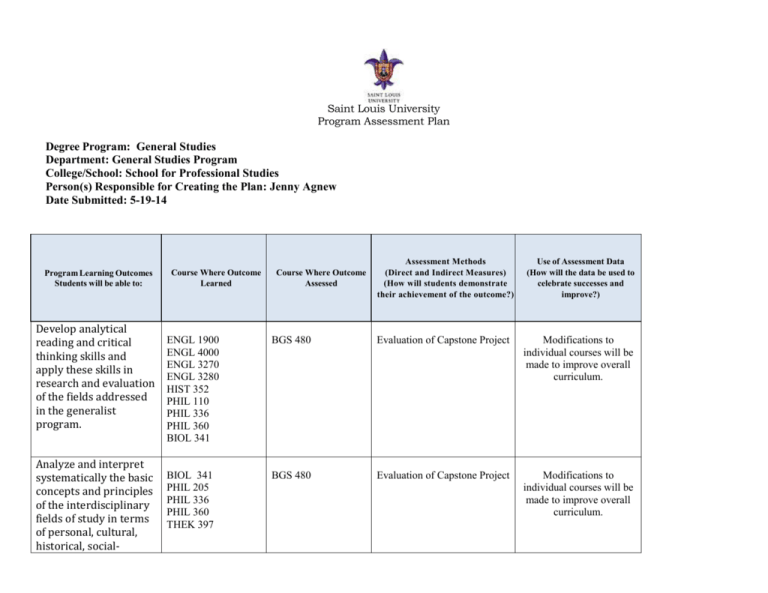
Saint Louis University Program Assessment Plan Degree Program: General Studies Department: General Studies Program College/School: School for Professional Studies Person(s) Responsible for Creating the Plan: Jenny Agnew Date Submitted: 5-19-14 Program Learning Outcomes Students will be able to: Develop analytical reading and critical thinking skills and apply these skills in research and evaluation of the fields addressed in the generalist program. Analyze and interpret systematically the basic concepts and principles of the interdisciplinary fields of study in terms of personal, cultural, historical, social- Course Where Outcome Learned Course Where Outcome Assessed Assessment Methods (Direct and Indirect Measures) (How will students demonstrate their achievement of the outcome?) Use of Assessment Data (How will the data be used to celebrate successes and improve?) ENGL 1900 ENGL 4000 ENGL 3270 ENGL 3280 HIST 352 PHIL 110 PHIL 336 PHIL 360 BIOL 341 BGS 480 Evaluation of Capstone Project Modifications to individual courses will be made to improve overall curriculum. BIOL 341 PHIL 205 PHIL 336 PHIL 360 THEK 397 BGS 480 Evaluation of Capstone Project Modifications to individual courses will be made to improve overall curriculum. psychological and moral aspects, and as related to contemporary issues Understand the integration of the multidisciplinary approach to each field of study in the general studies curriculum with an emphasis on research, theory, practice and personal experience. Examine and evaluate the cultural, historical and global influences of the arts, literature, history, philosophy, theology, and sciences revealed in the context and diversity of the contributors, mediums and major periods in time. Differentiate and synthesize common patterns and structures within the multidisciplinary framework of the arts, literature, history, philosophy and theology. Evaluation of Capstone Project Modifications to individual courses will be made to improve overall curriculum. BIOL 341 ENGL 4000 ENGL 3880 THEK 482 BGS 480 ARTH 380 ENGL 3270 ENGL 3280 ENGL 3350 ENGL 3330 ENGL 3540 HIST 348 HIST 352 HIST 363 PHIL 205 PHIL 360 THEK 397 THEK 482 BGS 480 Evaluation of Capstone Project Modifications to individual courses will be made to improve overall curriculum. ARTH 380 ENGL 3270 ENGL 3280 ENGL 3350 ENGL 3330 ENGL 3540 HIST 348 HIST 352 HIST 363 PHIL 205 BGS 480 Evaluation of Capstone Project Modifications to individual courses will be made to improve overall curriculum. PHIL 360 THEK 397 THEK 482 Recognize, interpret and critique the qualitative and quantitative dimensions of each discipline from different perspectives of inquiry, problem solving and assessment. Differentiate and evaluate the influences and significance of literary language and structure. Develop effective communication skills with emphasis on critical thinking, analysis and interpretation using alternative forms of expressions. Analyze and interpret data and apply methods of inquiry and critical analysis to practical Evaluation of Capstone Project Modifications to individual courses will be made to improve overall curriculum. BGS 480 Evaluation of Capstone Project Modifications to individual courses will be made to improve overall curriculum. ENGL 1500 ENGL 1900 ENGL 3060 ENGL 3880 ENGL 4000 PHIL 110 BGS 480 Evaluation of Capstone Project Modifications to individual courses will be made to improve overall curriculum. BIOL 138 PHIL 105 PHIL 110 PHIL 205 PHIL 336 BGS 480 Evaluation of Capstone Project Modifications to individual courses will be made to improve overall curriculum. ENGL 1900 PHIL 105 PHIL 110 BGS 480 ENGL 2020 ENGL 2600 ENGL 3060 ENGL 3270 ENGL 3280 ENGL 3330 ENGL 3540 ENGL 3350 ENGL 3560 ENGL 3880 ENGL 4000 situations in modern society. Compare and evaluate basic argument types, strategies and fallacies and apply these to practical situations and contemporary challenges. Demonstrate an understanding of the influence and contribution of other cultures and civilizations to contemporary society Develop effective leadership and team building skills through recognition and understanding of the interconnectedness and diverse perspectives of the multidisciplinary approach. Analyze and interpret basic belief systems in terms of personal, cultural, historical, social-psychological and moral aspects, and as related to contemporary issues. ENGL 1900 ENGL 1900 PHIL 105 PHIL 110 PHIL 205 BGS 480 Evaluation of Capstone Project Modifications to individual courses will be made to improve overall curriculum. ARTH 380 HIST 111 HIST 112 ENGL 3330 THEO 379 THEK 380 BGS 480 Evaluation of Capstone Project Modifications to individual courses will be made to improve overall curriculum. ENGL 4000 THEK 482 BGS 480 Evaluation of Capstone Project Modifications to individual courses will be made to improve overall curriculum. BIOL 138 BIOL 341 PHIL 205 PHIL 336 PHIL 360 THEK 361 THEK 384 THEK 397 THEK 481 BGS 480 Evaluation of Capstone Project Modifications to individual courses will be made to improve overall curriculum. THEK 482 Examine, differentiate and evaluate philosophical thinking and systematic reasoning as an instrument for guiding human existence. Examine, differentiate and evaluate ethical theories and principles and apply these to practical problems and contemporary issues of morality and justice. Demonstrate an understanding of the spiritual self, and the spiritual nature of other individuals and groups in society. PHIL 205 PHIL 336 PHIL 360 THEK 361 THEK 384 THEK 397 THEK 481 THEK 482 BGS 480 Evaluation of Capstone Project Modifications to individual courses will be made to improve overall curriculum. THEO 235 PHIL 205 PHIL 336 PHIL 360 THEK 481 BGS 480 Evaluation of Capstone Project Modifications to individual courses will be made to improve overall curriculum. THEO 235 THEO 351 THEO 356 THEO 379 THEK 361 THEK 380 THEK 384 THEK 397 THEK 481 THEK 482 BGS 480 Evaluation of Capstone Project Modifications to individual courses will be made to improve overall curriculum. It is not recommended to try and assess (in depth) all of the program learning outcomes every semester. It is best practice to plan out when each outcome will be assessed and focus on 1 or 2 each semester/academic year. Describe the responsibilities, timeline, and the process for implementing this assessment plan. The program assessment plan should be developed and approved by all faculty in the department. In addition, the program assessment plan should be developed to include student input and external sources (e.g., national standards, advisory boards, employers, alumni, etc.). Describe the process through which your academic unit created this assessment plan. Include the following: a. Timeline regarding when or how often this plan will be reviewed and revised. (This could be aligned with your unit’s departmental review schedule.) b. How students were included in the process and/or how student input was gathered and incorporated into the assessment plan. c. What external sources were consulted in the development of this assessment plan? d. Assessment of the manageability of the plan in relation to departmental resources and personnel
